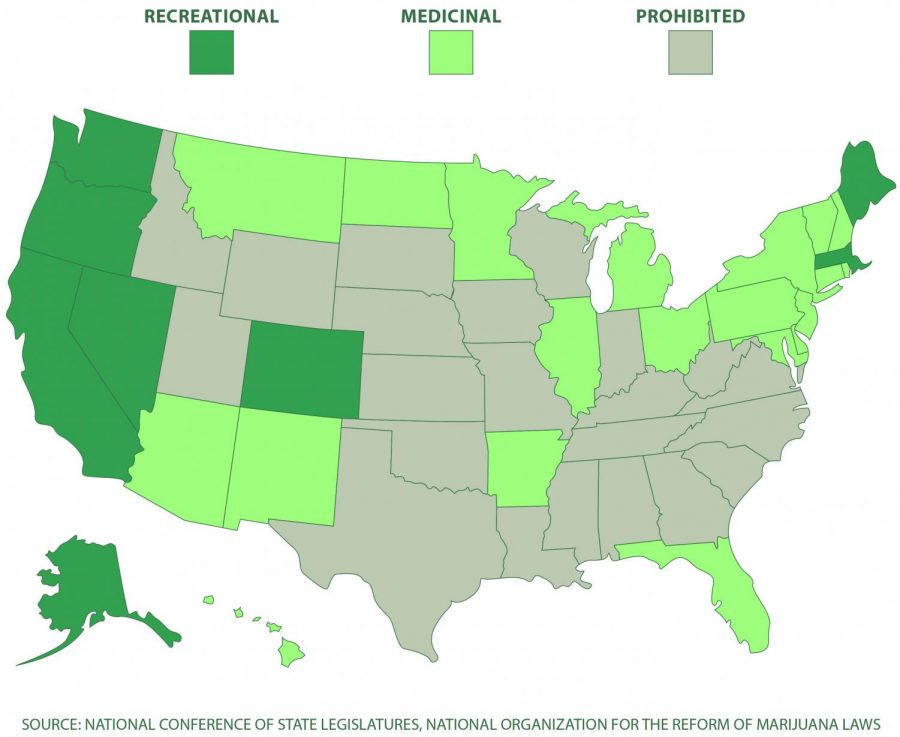Medical marijuana dispensary could soon arrive in Rogers Park
Medical marijuana dispensary could soon arrive in Rogers Park
December 12, 2016
Ald. Joe Moore (49th Ward) accepted a proposal by Bob Kingsley, owner of 420 Capital Management, to build Greengate Compassion Center, a new medical cannabis dispensary in the Rogers Park neighborhood.
“The proposed dispensary will perform a vital service and provide much needed relief to Rogers Park residents suffering from debilitating illnesses,” Moore stated in his decision to accept the proposal, posted on his website.
Kay Wallace, co-owner of Medical Marijuana of Illinois—an organization that provides medical marijuana educational resources—said it is important to provide accessible medical cannabis to those who need it because it is an effective alternative to prescription painkillers, which have more addictive components.
“[Patients] use it when they need it as far as pain reduction,” Wallace said. “These are patients who are using it to maintain a decent quality of life.”
Paul Lee, manager of Dispensary 33, a medical cannabis dispensary at 5001 N. Clark St., said medical cannabis and prescription painkillers both have their place in tackling pain management.
For serious pain, such as after surgery, opioids might be the better option; however, medical cannabis can be used as a bridge to ease off opioids, he added.
According to Moore’s website, in order to construct Greengate Compassion Center, 1930 W. Chase Ave., the property zoning must be changed from its current B-1 designation to B-3 by City Council, which allows for a greater business diversity. It will also require a special use permit from the City of Chicago Zoning Board of Appeals with approval from the Illinois Department of Financial and Professional Regulation.
If approved, this will be the 48th licensed dispensary in Illinois and the seventh in Chicago, according to Illinois Department of Financial and Professional Regulation data.
Wallace said in order to obtain a medical marijuana identification card in Illinois, a patient must get a recommendation from a certified physician and complete an application, which must be approved by the Illinois Department of Public Health. The individual also needs to be fingerprinted for a possible criminal background check.
According to IDPH data, qualifying medical conditions for marijuana treatment include cancer, sexual transmitted diseases and rheumatoid arthritis.
Brandon Smith, a manager at another medical marijuana dispensary which he requested not be identified by The Chronicle, said providing accessible medical marijuana takes away from the dangers of obtaining the product in the black market.
“By providing a safe, regulated access point for cannabis, it takes away people moving their cash around in the streets,” Smith said.
Lee said most people want to use cannabis legally, so it makes sense to construct more avenues to obtain it.
“Once they start to use and visit a legal dispensary, they choose to never go back to the black market,” Lee said.
Society has become more accepting of cannabis for medical use, according to Wallace; however, there are still barriers, such as marijuana being classified as a Schedule 1 drug, which restricts it from clinical trials.
Objective analysis of cannabis is needed for the community to understand the health benefits of the product because marijuana suffers from previous misconceptions, according to Lee.
“Once people understand [the benefits], this whole ridiculous notion of [cannabis] as something negative will go away,” Lee said.








